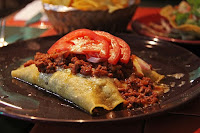(My new American Thinker post)
May 5 is Exhibit A in contrasts. Up here, it's a day to eat Mexican food and enjoy a parade. Down in Mexico, May 5 is a day to remember a battle that few people remember.
Back in 1862, the French met the Mexicans in Puebla, south of Mexico City. It was a consequential battle because a weaker Mexican force defeated the superior French army. This is the story:
It marks the unlikely 1862 victory of Mexican forces over French invaders in Puebla and is nearly as much a symbol of the nation's eternal struggle to maintain its independence as the 16th of September.
In the state of Puebla, it is a full-on holiday, with plenty of parades and merrymaking, as well as food and folklore festivals. But for most of the rest of Mexico, Cinco de Mayo (May 5, which this year falls on a Friday) has become a passé holiday, sometimes observed by government offices and schools in order to extend the Labor Day break, but infrequently revered for the importance it played in the nation's history.
Strangely enough, though, that is not the case in the United States, where May 5 is revered by Mexican immigrants and gringos alike as a celebration of all things Mexican, including music, art, food, drink and culture. For Mexicans and other Latinos living in the United States, the Cinco de Mayo holiday is seen as an alternative Mexican Independence Day, especially in Los Angeles, San Jose, San Francisco, San Antonio, Sacramento, Albuquerque, Denver and El Paso, where large segments of the population have Mexican roots.
And by osmosis, Cinco de Mayo has become a day that commemorates the role that Mexican immigrants have played in their adopted home, with many public schools and offices equating it with Mexican heritage and traditions and even hoisting Mexican flags in honor of the occasion.
The holiday has become so ingrained in U.S. culture, in fact, that 16 years ago, lawmakers in Washington passed a resolution calling for its recognition as a historically significant holiday. But while the United States may have expropriated the Cinco de Mayo holiday as its own, the events it commemorates are strictly Mexican.
Cinco de Mayo officially marks the anniversary of the Battle of Puebla, led by Ignacio Zaragoza against Napoleon III's forces, but not the expulsion of the French from Mexico, which would take another five years to come to pass. Perhaps it was the fleeting nature of Zaragoza's success that is behind the disremembering of the once-important holiday in Mexico, or the fact that it has evolved into a confused gringo celebration of Mexican ethnicity.
But for whatever reasons it has lost relevance nationally, it is still on the books as a date of Mexican glory on the battlefield, and certainly merits a hat tip in Mexico, especially if you consider how many tequilas are being raised to toast the Cinco north of the border.
Yes, a consequential victory goes largely unnoticed. I lived and worked in Mexico City and saw very little about this day. I remember a few military academies celebrating the day with parades and flag-waving. As the article points out, most of the country doesn't see it as much to celebrate.
What would have happened if Mexico had lost this battle? It could have been a major victory for France and its ambitions to turn Mexico into its Algeria on this side of the world.
My Mexican friends love that we enjoy enchiladas and beer on "Cinco de Mayo." They say "mucho gusto amigo." At the same time, they'd love their "Cinco" back and more recognition of an important battle and the brave men who fought that day.
PS: Check out my blog for posts, podcasts, and videos.
